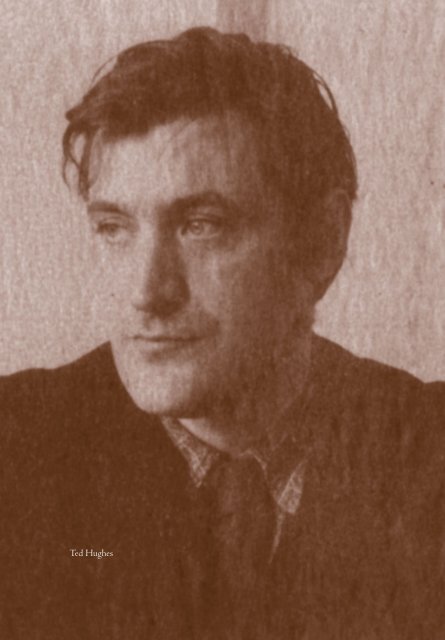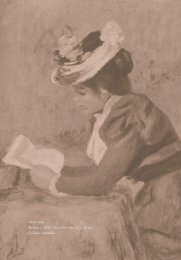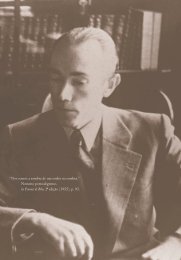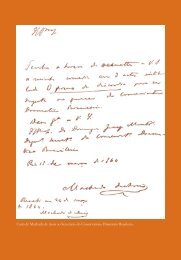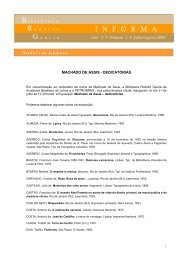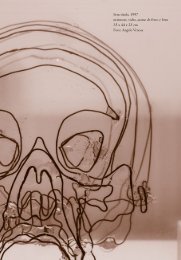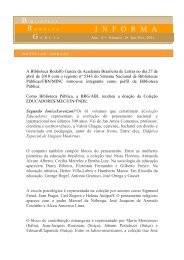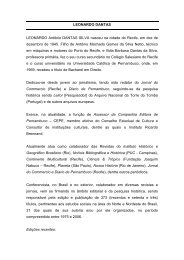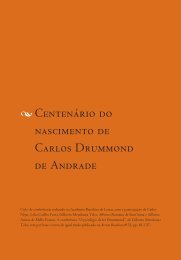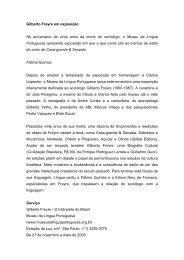Poesia Estrangeira - Academia Brasileira de Letras
Poesia Estrangeira - Academia Brasileira de Letras
Poesia Estrangeira - Academia Brasileira de Letras
Create successful ePaper yourself
Turn your PDF publications into a flip-book with our unique Google optimized e-Paper software.
Ted Hughes
Ted Hughes<br />
<strong>Poesia</strong> <strong>Estrangeira</strong><br />
Tradução e notas <strong>de</strong> Marcus Salgado<br />
Edward James Hughes (1930-1998) foi um poeta laureado,<br />
dramaturgo, escritor <strong>de</strong> livros infantis e tradutor, dos mais<br />
importantes nos quadros da literatura inglesa do século XX. Em<br />
1956 casou-se com a poeta norte-americana Sylvia Plath, com<br />
quem viveu um tumultuado relacionamento, que culminou com<br />
a separação em 1963. No mesmo ano, Sylvia cometeu suicídio,<br />
asfixiada pelo gás <strong>de</strong> cozinha em sua casa, aos 30 anos <strong>de</strong> ida<strong>de</strong>.<br />
Esse evento teve consequências perturbadoras para Ted Hughes,<br />
a tal ponto que, mais <strong>de</strong> uma década <strong>de</strong>pois, ainda tentava registrar,<br />
em poemas como “A última carta”, o impacto experimentado<br />
após o suicídio <strong>de</strong> Sylvia Plath. Inédito até 2010 (quando foi resgatado<br />
do acervo da British Library e preparado para publicação<br />
no perió dico New Statesman), “A última carta” se dispõe a lidar<br />
diretamente com o suicídio <strong>de</strong> Plath. O poema evoca o <strong>de</strong>rra<strong>de</strong>iro<br />
encontro entre Ted e Sylvia, ocorrido poucos dias antes da<br />
morte da poeta. De acordo com a versão nele apresentada, Sylvia<br />
teria escrito um bilhete en<strong>de</strong>reçado a Ted, com possível alusão ao<br />
277<br />
Marcus Salgado<br />
é doutor em<br />
Literatura<br />
Comparada<br />
(UFRJ) e mestre<br />
em Literatura<br />
<strong>Brasileira</strong> (UFRJ).<br />
Autor <strong>de</strong> A vida<br />
vertiginosa dos signos<br />
(2007; ensaios)<br />
e responsável,<br />
na qualida<strong>de</strong><br />
<strong>de</strong> conselheiro<br />
editorial da<br />
Editora Antiqua<br />
(São Paulo), pela<br />
reedição <strong>de</strong> obras<br />
<strong>de</strong> João do Rio,<br />
Flavio <strong>de</strong> Carvalho,<br />
José do Patrocínio<br />
Filho e Elysio <strong>de</strong><br />
Carvalho. Traduziu<br />
fragmentos <strong>de</strong><br />
Cruz e Sousa e<br />
Sosígenes Costa<br />
para a antologia<br />
Black, Brown and<br />
Beige (University of<br />
Texas, 2009).
Tradução e notas <strong>de</strong> Marcus Salgado<br />
suicídio. Postada na manhã <strong>de</strong> sexta, a correspondência <strong>de</strong>veria ter chegado<br />
às mãos do <strong>de</strong>stinatário após sua morte, mas, por obra do eficiente serviço<br />
postal inglês, acabou por ser entregue no mesmo dia. A crer na narrativa do<br />
poema, Ted teria se dirigido à casa <strong>de</strong> Sylvia, on<strong>de</strong> ela queimou o bilhete,<br />
“com um estranho sorriso”. A publicação <strong>de</strong> “A última carta” gerou gran<strong>de</strong><br />
polêmica, tanto no que diz respeito à versão dos fatos apresentada por<br />
Ted Hughes, como no que pertine à edição póstuma <strong>de</strong> textos incompletos<br />
pertencentes ao espólio <strong>de</strong> um escritor. Quer se consi<strong>de</strong>re verídica ou fantasiosa<br />
a narrativa <strong>de</strong> Hughes, “A última carta” é um poema que, embora<br />
incompleto, contém inegáveis qualida<strong>de</strong>s imagísticas e emocionais.<br />
278
Sylvia Plath e Ted Hughes.<br />
Ted Hughes<br />
Autógrafo em exemplar da primeira edição <strong>de</strong> Selected Poems, 1957-1981, <strong>de</strong> Ted Hughes,<br />
publicado pela editora Faber and Faber, <strong>de</strong> Londres, em 1982.<br />
279
Tradução e notas <strong>de</strong> Marcus Salgado<br />
A última carta<br />
O que aconteceu naquela noite? Tua última noite.<br />
Dupla, tripla exposição 1<br />
De tudo. Viva eu te vi pela última vez<br />
No cair da tar<strong>de</strong> <strong>de</strong> sexta-feira<br />
A queimar no cinzeiro com um estranho sorriso<br />
A carta a mim en<strong>de</strong>reçada. Atrapalhei teus planos?<br />
A surpresa chegou antes do previsto?<br />
Minha resposta foi rápida <strong>de</strong>mais?<br />
Uma hora mais tar<strong>de</strong> e terias rumado<br />
Para on<strong>de</strong> eu não te pu<strong>de</strong>sse encontrar<br />
E eu teria me afastado <strong>de</strong> tua porta fechada e vermelha<br />
A que ninguém abriria<br />
Com tua carta na mão,<br />
Um raio que não conseguiu chegar à terra.<br />
Isso para mim teria sido um tratamento <strong>de</strong> choque<br />
Que se repetiria durante todo o final <strong>de</strong> semana<br />
Quando eu a lesse ou nela simplesmente pensasse.<br />
Isso teria reor<strong>de</strong>nado meu pensamento e minha vida<br />
O tratamento que planejavas necessitava <strong>de</strong> tempo<br />
Não posso imaginar como<br />
Teria suportado aquele fim <strong>de</strong> semana.<br />
Não posso imaginar. Tinhas já tudo planejado?<br />
Tua mensagem chegou bem <strong>de</strong>pressa até mim – no mesmo dia,<br />
Sexta à tar<strong>de</strong>, postada pela manhã.<br />
Expediram-na os <strong>de</strong>mônios que sempre prevalecem<br />
Esse foi mais um dos lances <strong>de</strong> má sorte<br />
1 Na linguagem fotográfica chama-se dupla ou tripla exposição quando a película é exposta, mais <strong>de</strong> uma<br />
vez, a imagens diferentes, que se sobrepõem. Trata-se <strong>de</strong> efeito artístico que gera uma aura fantasmagórica<br />
na fotografia. [N. do T.]<br />
280
Last letter<br />
What happened that night? Your final night.<br />
Double, treble exposure<br />
Over everything. Late afternoon. Friday.<br />
My last sight of you alive.<br />
Burning your letter to me, in the ashtray,<br />
With that strange smile. Had I bungled your plan?<br />
Had it surprised me sooner than you purposed?<br />
Had I rushed it back to you too promptly?<br />
One hour later – you would have been gone<br />
Where I could not have traced you.<br />
I would have turned from your locked red door<br />
That nobody would open<br />
Still holding your letter,<br />
A thun<strong>de</strong>rbolt that could not earth itself.<br />
That would have been electric shock treatment<br />
For me.<br />
Repeated over and over, all weekend,<br />
As often as I read it, or thought of it.<br />
That would have rema<strong>de</strong> my brains, and my life.<br />
The treatment that you planned nee<strong>de</strong>d some time.<br />
I cannot imagine<br />
How I would have got through that weekend.<br />
I cannot imagine. Had you plotted it all?<br />
Your note reached me too soon – that same day,<br />
Friday afternoon, posted in the morning.<br />
The prevalent <strong>de</strong>vils expedited it.<br />
That was one more straw of ill-luck<br />
Ted Hughes<br />
281
Tradução e notas <strong>de</strong> Marcus Salgado<br />
Que contra ti cometeu o correio<br />
E que se acrescentou a teu fardo. Saí rapidamente pela neve<br />
Já azulada em fevereiro. Anoitecia em Londres.<br />
Chorei <strong>de</strong> alívio quando abriste a porta.<br />
Confusão <strong>de</strong> enigmas em solução. Lágrimas precoces<br />
Que não pu<strong>de</strong> interpretar, que fracassaram ao comunicar<br />
Sua verda<strong>de</strong>ira importância. Porém, o que disseste<br />
Sobre as cinzas ainda fumegantes <strong>de</strong>ssa carta<br />
Destruída com tanto cuidado, com tanta calma,<br />
Permitiu que eu partisse, que eu te <strong>de</strong>ixasse<br />
Para soprares as cinzas <strong>de</strong> teu plano, do cinzeiro<br />
Sobre o qual te <strong>de</strong>bruçarias para que eu lesse<br />
O número <strong>de</strong> telefone do médico.<br />
Minha fuga<br />
Converteu-se em assombração<br />
Desesperançado e insone, com todos os sonhos exauridos.<br />
E eu só queria tornar a capturá-los, só queria<br />
Cair em algum lugar fora <strong>de</strong>sse vazio.<br />
Dois dias sem fazer nada. Dois dias grátis.<br />
Dois dias fora <strong>de</strong> qualquer calendário, mas roubados<br />
Do mundo<br />
Para além da realida<strong>de</strong>, dos sentimentos e dos nomes.<br />
Minha vida amorosa tomou posse. Minha entorpecida vida amorosa<br />
Com suas duas agulhas loucas 2 ,<br />
Tecendo sua rosa, perfurando e puxando com força<br />
Na tapeçaria sua tatuagem sangrenta<br />
Em algum lugar <strong>de</strong>ntro <strong>de</strong> mim, atrás <strong>de</strong> meu umbigo,<br />
Traçando esse brasão confuso,<br />
2 É possível pensar que na imagem das duas mulheres com suas agulhas loucas se encontra uma alusão<br />
ao comportamento emocionalmente instável <strong>de</strong> Sylvia Plath e Assia Wevill. [N. do T.]<br />
282
Drawn against you by the Post-Office<br />
And ad<strong>de</strong>d to your load. I moved fast,<br />
Through the snow-blue, February, London twilight.<br />
Wept with relief when you opened the door.<br />
A huddle of riddles in solution. Precocious tears<br />
That failed to interpret to me, failed to divulge<br />
Their real import. But what did you say<br />
Over the smoking shards of that letter<br />
So carefully annihilated, so calmly,<br />
That let me release you, and leave you<br />
To blow its ashes off your plan – off the ashtray<br />
Against which you would lean for me to read<br />
The Doctor’s phone-number.<br />
My escape<br />
Had become such a hunted thing<br />
Sleepless, hopeless, all its dreams exhausted,<br />
Only waiting to be recaptured, only<br />
Wanting to drop, out of its vacuum.<br />
Two days of dangling nothing. Two days gratis.<br />
Two days in no calendar, but stolen<br />
From no world,<br />
Beyond actuality, feeling, or name.<br />
My love-life grabbed it. My numbed love-life<br />
With its two mad needles,<br />
Embroi<strong>de</strong>ring their rose, piercing and tugging<br />
At their tapestry, their bloody tattoo<br />
Somewhere behind my navel,<br />
Treading that morass of emblazon,<br />
Ted Hughes<br />
283
Tradução e notas <strong>de</strong> Marcus Salgado<br />
Duas agulhas loucas cruzando os pontos,<br />
Escolhendo entre meus nervos<br />
Em função <strong>de</strong> suas cores, a me remo<strong>de</strong>lar<br />
Por <strong>de</strong>ntro <strong>de</strong> minha pele, uma refazendo a outra<br />
Como uma autocaricatura,<br />
Seu obsessivo entrar e sair. Duas mulheres<br />
Cada uma com uma agulha.<br />
Naquela noite<br />
Minha Susan <strong>de</strong>llarobbia 3 . Movimentei-me<br />
Com a circunspecção<br />
De uma chama num pavio. Toda minha fúria<br />
Era um esforço abandonado para explodir<br />
O velho globo sobre o qual as sombras dobram<br />
Meu rastro <strong>de</strong>nunciador <strong>de</strong> cinzas. Corri<br />
De um lado a outro, olhando para trás, um filme invertido,<br />
Rumo ao quê? Fomos até Rugby Street<br />
On<strong>de</strong> tu e eu começamos 4 .<br />
Por que fomos lá? Com tantos lugares<br />
Por que fomos lá? A perversida<strong>de</strong><br />
Na arte <strong>de</strong> nosso <strong>de</strong>stino<br />
Ajustou seus refinamentos para ti, para mim,<br />
Para Susan. Jogo solitário<br />
3 Seria a poeta Susan Alliston, segundo Melvyn Bragg, um dos responsáveis pelo estabelecimento do<br />
texto e pela publicação do poema. O verso contém, ainda, uma possível menção à família <strong>de</strong> escultores<br />
florentinos <strong>de</strong>lla Robbia (Luca, Andrea e Giovanni), famosos pela graça, pela perfeição e pela sedução<br />
<strong>de</strong> suas figuras. [N. do T.]<br />
4 Em março <strong>de</strong> 1956, na véspera <strong>de</strong> viajar para Paris, Sylvia Plath visitou Ted Hughes, que então residia<br />
no número 18 da Rugby Street – conforme se lê no poema “18 Rugby Street”, incluído em Birthday<br />
letters, livro <strong>de</strong> poemas publicado poucos meses antes da morte do poeta. [N. do T.]<br />
284
Two mad needles, criss-crossing their stitches,<br />
Selecting among my nerves<br />
For their colours, refashioning me<br />
Insi<strong>de</strong> my own skin, each refashioning the other<br />
With their self-caricatures,<br />
Their obsessed in and out. Two women<br />
Each with her needle.<br />
That night<br />
My <strong>de</strong>llarobbia Susan. I moved<br />
With the circumspection<br />
Of a flame in a fuse. My whole fury<br />
Was an abandoned effort to blow up<br />
The old globe where shadows bent over<br />
My telltale track of ashes. I raced<br />
From and from, face backwards, a film reversed,<br />
Towards what? We went to Rugby St<br />
Where you and I began.<br />
Why did we go there? Of all places<br />
Why did we got there? Perversity<br />
In the artistry of our fate<br />
Adjusted its refinements for you, for me<br />
And for Susan. Solitaire<br />
Ted Hughes<br />
285
Tradução e notas <strong>de</strong> Marcus Salgado<br />
A que se entregava o Minotauro daquele labirinto 5<br />
Incluindo até mesmo Helen, no apartamento térreo.<br />
Reparaste nela: personagem para um conto.<br />
Não a conheceste. Poucos a conheceram<br />
A não ser através dos ouvidos e da máscara <strong>de</strong>lirante<br />
De seu cão pastor-alemão. Tu nem mesmo a viste <strong>de</strong> relance.<br />
Apenas te encolheste<br />
Quando o cão <strong>de</strong>mente lançou seu peso<br />
Contra a porta enquanto <strong>de</strong>slizávamos pelo corredor<br />
E o ouvíamos a engasgar em seu infinito ódio alemão.<br />
Naquela noite <strong>de</strong> domingo ela <strong>de</strong>ixou a porta aberta<br />
Uns poucos centímetros<br />
Susan saudou aqueles olhos negros, o infeliz<br />
Sobrepeso e o rosto cativante que apareceram<br />
Por trás da corrente do trinco. A porta se fechou.<br />
Ouvimo-la a consolar o carcereiro<br />
Dentro <strong>de</strong> sua cela, o canil, on<strong>de</strong>, dias <strong>de</strong>pois,<br />
Ela sufocou com gás a feroz criatura e a si mesma.<br />
Eu e Susan passamos aquela noite<br />
Em nosso leito nupcial. Não havia visto esta cama<br />
Des<strong>de</strong> que nela nos <strong>de</strong>itamos em nossa primeira noite.<br />
Não a levei <strong>de</strong> volta para minha cama.<br />
Ocorrera-me que, com o final <strong>de</strong> semana,<br />
Po<strong>de</strong>rias aparecer, uma visita surpresa.<br />
Apareceste, para tamborilar em minha sombria janela?<br />
Permaneci com Susan, escon<strong>de</strong>ndo-me <strong>de</strong> ti,<br />
Em nosso leito nupcial – o mesmo <strong>de</strong> que<br />
5 A imagem do apartamento <strong>de</strong> Rugby Street como um labirinto também está presente no poema “18<br />
Rugby Street”. Em certo momento, lê-se: “Ele é possuído/Quem quer que nele penetre nunca sai <strong>de</strong><br />
verda<strong>de</strong>/ Quem quer nele entre entra num labirinto”. [N. do T.]<br />
286
Played by the Minotaur of that maze<br />
Even inclu<strong>de</strong>d Helen, in the ground-floor flat.<br />
You had noted her – a girl for a story.<br />
You never met her. Few ever met her,<br />
Except across the ears and raving mask<br />
Of her Alsatian. You had not even glimpsed her.<br />
You had only recoiled<br />
When her <strong>de</strong>mented animal crashed its weight<br />
Against her door, as we slipped through the hallway;<br />
And heard it chocking on infinite German hatred.<br />
That Sunday night she eased her door open<br />
Its few permitted inches.<br />
Susan greeted the black eyes, the unhappy<br />
Overweight, lovely face, that peeped out<br />
Across the little chain. The door closed.<br />
We heard her consoling her jailor<br />
Insi<strong>de</strong> her cell, its kennel, where, days later,<br />
She gassed her ferocious kupo, and herself.<br />
Susan and I spent that night<br />
In our wedding bed. I had not seen it<br />
Since we lay there on our wedding day.<br />
I did not take her back to my own bed.<br />
It had occurred to me, your weekend over,<br />
You might appear – a surprise visitation.<br />
Did you appear, to tap at my dark window?<br />
So I stayed with Susan, hiding from you,<br />
In our own wedding bed – the same from which<br />
Ted Hughes<br />
287
Tradução e notas <strong>de</strong> Marcus Salgado<br />
Três anos <strong>de</strong>pois a levariam para morrer<br />
Naquele mesmo hospital on<strong>de</strong>, <strong>de</strong>ntro <strong>de</strong> doze horas,<br />
Eu te encontraria morta.<br />
Na manhã <strong>de</strong> segunda<br />
Levei-a ao trabalho, no centro,<br />
E então estacionei meu veículo ao norte <strong>de</strong> Euston Road<br />
E retornei para on<strong>de</strong> o telefone me esperava.<br />
O que aconteceu naquela noite, em tuas horas,<br />
Ninguém o sabe, é como se nunca tivesse acontecido.<br />
A cumulação <strong>de</strong> toda tua vida,<br />
Como um esforço inconsciente, como um nascimento<br />
A fazer avançar a membrana <strong>de</strong> cada lento instante<br />
Para o interior do seguinte, ocorreu<br />
Como se não pu<strong>de</strong>sse ocorrer<br />
Como se não estivesse ocorrendo. Quantas vezes<br />
Tocou o telefone em meu quarto vazio,<br />
Tu a ouvir o toque no aparelho –<br />
E <strong>de</strong> um lado e <strong>de</strong> outro da linha a memória<br />
De um toque <strong>de</strong> telefone a se <strong>de</strong>svanecer<br />
Na mente, como se já morta. Conto as vezes<br />
Que possas ter caminhado até a cabine telefônica<br />
No final <strong>de</strong> Saint George’s Terrace 6 .<br />
Ali estás sempre que olho, saindo<br />
De Fitzroy Road 7 , atravessando<br />
Por entre as margens abarrotadas <strong>de</strong> açúcar sujo.<br />
Em teu longo sobretudo negro<br />
Tua trança enrolada na parte <strong>de</strong> trás do cabelo<br />
6 Próximo à Primrose Hill Road, portanto <strong>de</strong>ntro do perímetro evocado pela geografia sentimental do<br />
poema. [N. do T.]<br />
7 Sylvia Plath se matou na casa número 23 <strong>de</strong>sta rua londrina. O en<strong>de</strong>reço tem uma tradição literária,<br />
pois, antes <strong>de</strong> Sylvia, nele residiu o poeta W. B. Yeats. [N. do T.]<br />
288
Within three years she would be taken to die<br />
In that same hospital where, within twelve hours,<br />
I would find you <strong>de</strong>ad.<br />
Monday morning<br />
I drove her to work, in the City,<br />
Then parked my van North of Euston Road<br />
And returned to where my telephone waited.<br />
What happened that night, insi<strong>de</strong> your hours,<br />
Is as unknown as if it never happened.<br />
What accumulation of your whole life,<br />
Like effort unconscious, like birth<br />
Pushing through the membrance of each slow second<br />
Into the next, happened<br />
Only as if it could not happen,<br />
As if it was not happening. How often<br />
Did the phone ring there in my empty room,<br />
You hearing the ring in your receiver –<br />
At both ends the fading memory<br />
Of a telephone ringing, in a brain<br />
As if already <strong>de</strong>ad. I count<br />
How often you walked to the phone-booth<br />
At the bottom of St George’s terrace.<br />
You are there whenever I look, just turning<br />
Out of Fitzroy Road, crossing over<br />
Between the heaped up banks of dirty sugar.<br />
In your long black coat,<br />
With your plait coiled up at the back of your hair<br />
Ted Hughes<br />
289
Tradução e notas <strong>de</strong> Marcus Salgado<br />
Andas mas não consegues mover-te, ou acordar,<br />
E já ninguém mais anda,<br />
Andando pela balaustrada sob Primrose Hill 8<br />
Rumo à cabine telefônica nunca alcançada.<br />
Antes da meia-noite. Depois da meia-noite. Novamente.<br />
Novamente. Novamente. E, às raias da alvorada, novamente.<br />
Em que posição dos ponteiros do relógio<br />
Foi que fizeste tua última tentativa<br />
Já bem além <strong>de</strong> minha capacida<strong>de</strong> <strong>de</strong> escutá-la, que sacudiste<br />
O travesseiro daquela cama vazia? Uma última vez<br />
Tocaste suavemente em meus livros e em meus papéis?<br />
Quando cheguei o telefone dormia.<br />
O travesseiro inocente. Meu quarto dormia,<br />
Cheio da nívea luz matinal.<br />
Acendi o fogo. Saquei meus papéis.<br />
Mal tinha começado a escrever quando o telefone<br />
Estremeceu, num alarme tagarela,<br />
Recordando tudo. Em minha mão ele se recuperou.<br />
E <strong>de</strong>pois uma voz que soava como uma arma escolhida<br />
Ou uma injeção medida<br />
Friamente pronunciou as quatro palavras<br />
No fundo <strong>de</strong> meu ouvido: “Sua esposa está morta”.<br />
8 Nesta região <strong>de</strong> Londres situava-se um dos en<strong>de</strong>reços <strong>de</strong> Sylvia e Ted quando casados: 3 Chalcot Square.<br />
Posteriormente, já separados, Sylvia voltou a habitar nas cercanias, em Fitzroy Road. [N. do T.]<br />
290
You walk unable to move, or wake, and are<br />
Already nobody walking<br />
Walking by the railings un<strong>de</strong>r Primrose Hill<br />
Towards the phone booth that can never be reached.<br />
Before midnight. After midnight. Again.<br />
Again. Again. And, near dawn, again.<br />
At what position of the hands on my watch-face<br />
Did your last attempt,<br />
Already <strong>de</strong>eply past<br />
My being able to hear it, shake the pillow<br />
Of that empty bed? A last time<br />
Lightly touch at my books, and my papers?<br />
By the time I got there my phone was asleep.<br />
The pillow innocent. My room slept,<br />
Already filled with the snowlit morning light.<br />
I lit my fire. I had got out my papers.<br />
And I had started to write when the telephone<br />
Jerked away, in a jabbering alarm,<br />
Remembering everything. It recovered in my hand.<br />
Then a voice like a selected weapon<br />
Or a measured injection,<br />
Coolly <strong>de</strong>livered its four words<br />
Deep into my ear: ‘Your wife is <strong>de</strong>ad.’<br />
Ted Hughes<br />
291


